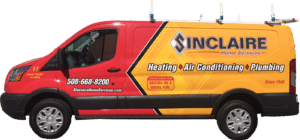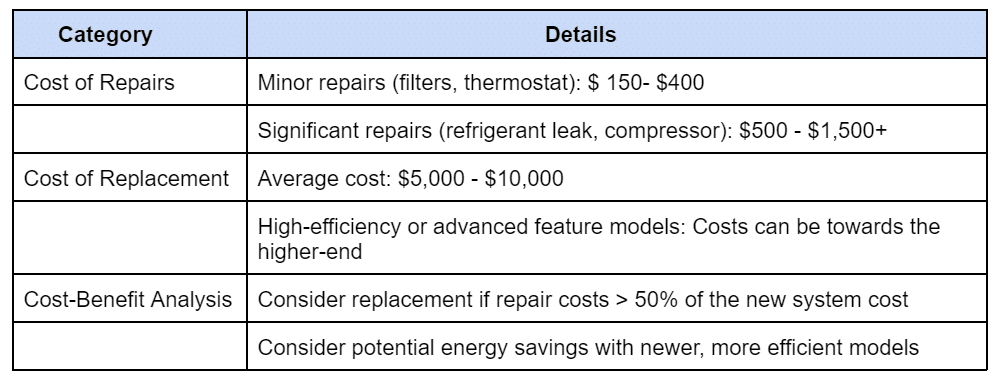Average HVAC System Lifespan: How to Know When to Repair or Replace
BLOG CATEGORIES
140 South St., Walpole, MA 02081
P (508) 668-8200 Toll Free (877) 668-8822
info@sinclaireboston.com
Master Plumber License #9530,
Sheet Metal Master-Unrestricted #5442
Sinclaire Enterprises, Inc.
140 South St., Walpole, MA 02081
P 508.668.8200 Toll Free 877.668.8822 info@sinclaireboston.com
Master Plumber License #9530,
Sheet Metal Master-Unrestricted #5442
need service?
let us contact you
Your HVAC system is one of the most important things in your home, affecting your comfort, energy costs, and budget. Understanding the lifespan of your HVAC system is essential for making informed decisions about whether to repair or replace it. This article will guide you through what to expect from your HVAC lifespan, how to extend it, and when it’s time for a new one.
What is the Average Lifespan of an HVAC System?
On average, an HVAC system will last between 15 to 25 years. This range can vary significantly based on the type of system, the quality of installation, and how well it has been maintained over the years. Regular maintenance can push the upper limits of this range, while neglect could lead to a shorter lifespan.
HVAC Maintenance Checklist to Maximize Lifespan
The key to HVAC longevity is proper maintenance. Below is a checklist of maintenance tips to ensure your system operates efficiently for as long as possible:
- Regularly replace or clean air filters.
- Schedule annual professional inspections.
- Keep the HVAC area clear of debris and foliage.
- Ensure all vents and registers are unblocked.
- Check and maintain coolant levels.
- Inspect the fan and blower motor and keep them clean.
- Check thermostats and control systems for proper function
Factors That Influence HVAC Lifespan
There are several key factors can affect an HVAC’s lifespan: how it was installed, how often it is maintained, type of system, etc. Understanding these factors can help you ensure it runs more and potentially extend your unit’s lifespan. Let’s dive into the things that have a significant impact on HVAC longevity.
Installation Quality
Proper installation of an HVAC system is foundational to its efficiency and longevity. Poorly installed systems often experience more frequent breakdowns and may have a shorter lifespan due to improper sizing or faulty setups.
Maintenance Frequency
Regular maintenance is crucial to extending an HVAC’s life. Systems that receive periodic tune-ups, cleaning, and repairs can outlast those that are neglected. Maintenance also helps in keeping the system running at peak efficiency.
Usage Patterns
How frequently and intensely the system is used can also affect its lifespan. Systems in hotter climates or those running at high capacity for long periods typically wear out faster than those in milder climates or used less intensively.
System Type and Quality
The type of HVAC system, along with the quality of its components, plays a significant role in determining how long it will last. Higher-quality systems with robust designs are generally capable of longer service lives than lower-quality alternatives.
Signs You Need an HVAC Replacement vs. Repair
Deciding whether to repair or replace your HVAC system can be challenging. Understanding the signs that indicate the need for a replacement over a repair will help you make the smartest choice for the comfort of your home and your wallet.
Here are some key indicators to watch for:
Age of the System
The age of your HVAC system plays a critical role in deciding whether to repair or replace it. If your system is close to or beyond its expected lifespan it may be wise to invest in a new one. It’s important to note that older systems are usually more prone to breakdowns and tend to be less energy-efficient than newer models.
Frequency of Repairs
Increasing the frequency of repairs can be a sign that your HVAC system is reaching the end of its useful life. When repairs become more frequent and costly, replacement might be a more financially sensible option.
Energy Bills
An increase in energy bills can indicate that your HVAC system is losing efficiency. If your energy consumption has increased without a corresponding increase in usage, the system may be deteriorating and might need replacement.
Overall Comfort
Decreased effectiveness in maintaining comfortable temperatures can be a sign that your system is wearing out. Inconsistencies in heating or cooling and increased humidity levels in the home often mean the system is no longer capable of performing at its best.
Related Articles:
When Is the Best Time To Replace an HVAC System?
Scary HVAC Noises You Should Never Ignore
How Much Is It to Replace an HVAC vs Repair It?
When facing HVAC issues, one of the biggest considerations is cost. Let’s compare the difference in cost between an HVAC repair and replacement as well as guidance on which decision is best for you.
Replace and Repair Cost Analysis
Cost of Repairs
The cost of repairing an HVAC system can vary widely depending on the nature of the problem. Minor repairs such as replacing filters or fixing a thermostat may be relatively inexpensive, typically ranging from $150 to $400. However, more significant repairs, such as fixing a refrigerant leak or replacing a compressor, can be much more costly, potentially running between $500 to $1,500 or more.
Cost of Replacement
Replacing an HVAC system involves more substantial expenses but can offer long-term savings in terms of reliability and energy efficiency. On average, the cost to replace an HVAC system ranges from $5,000 to $10,000, depending on the system and installation factors. High-efficiency models or those with additional features like zoning systems can push costs toward the higher end.
Cost-Benefit Analysis
When deciding between repair and replacement, consider a cost-benefit analysis. If your system is older and the cost of repair is more than 50% of the cost of a new system, replacement might be the better option. Also, consider potential energy savings with a new system. Newer models are generally more energy-efficient and can reduce your energy bills significantly, which can offset the initial investment over time.
Choose Sinclaire Home Services for Your HVAC Needs
Whether you need an HVAC replacement or repair, Sinclaire Home Services can help. Our family-owned business has served the Boston area since 1948. Our licensed technicians are committed to providing expert HVAC services and exceptional customer service.
Give us a call at (508) 668-8200 or contact us online to learn more or schedule your HVAC service today!
OUR SERVICE AREAS
- Ashland, Ma
- Attleboro, Ma
- Bellingham, Ma
- BLACKSTONE, MA
- BRIDGEWATER, MA
- Canton, Ma
- Dedham, Ma
- Dover, Ma
- EAST BRIDGEWATER, MA
- Easton, Ma
- Foxborough, Ma
- Framingham, Ma
- Franklin, Ma
- Holliston, Ma
- HOPEDALE, MA
- Hopkinton, Ma
- Mansfield, Ma
- Medfield, Ma
- Medway, Ma
- MENDON, MA
- MILFORD, MA
- MILLIS, MA
- MILLVILLE, MA
- MILTON, MA
- NATICK, MA
- NEEDHAM, MA
- NEWTON, MA
- NORFOLK, MA
- NORTH ATTLEBORO, MA
- NORTON, MA
- NORWOOD, MA
- PLAINVILLE, MA
- RANDOLPH, MA
- RAYNHAM, MA
- SHARON, MA
- SHERBORN, MA
- STOUGHTON, MA
- SUDBURY, MA
- TAUNTON, MA
- WALPOLE, MA
- WAYLAND, MA
- WELLESLEY, MA
- WEST BRIDGEWATER, MA
- WEST ROXBURY, MA
- WESTON, MA
- WESTWOOD, MA
- WRENTHAM, MA
AFFILIATIONS






